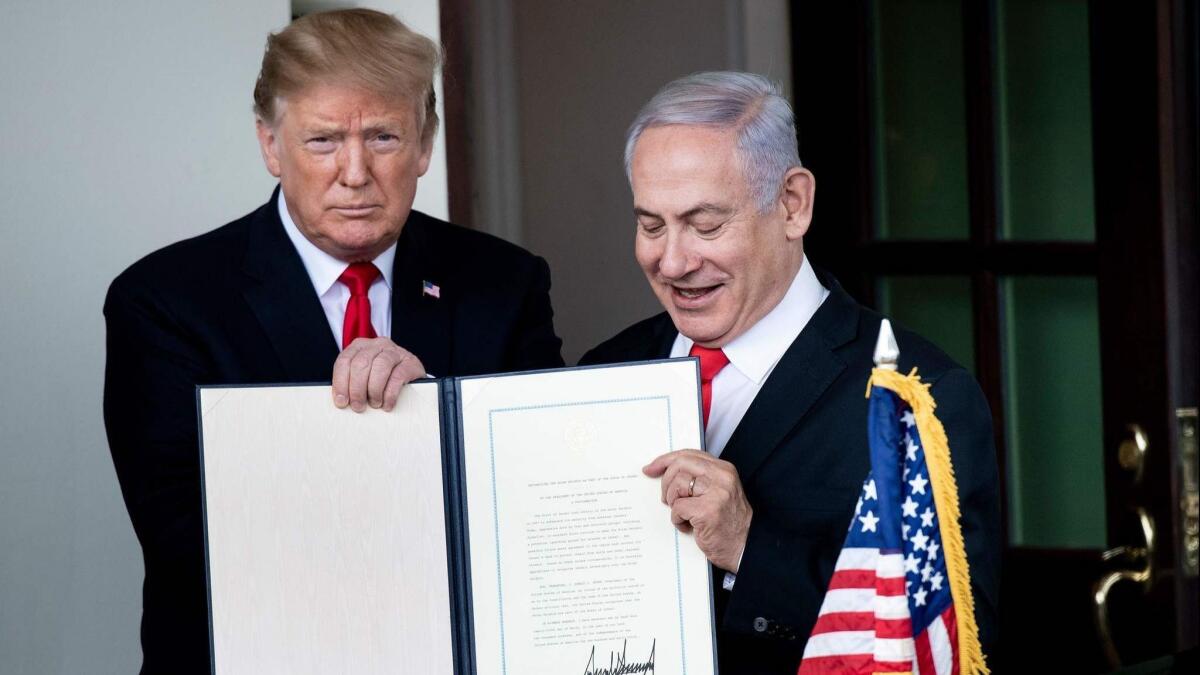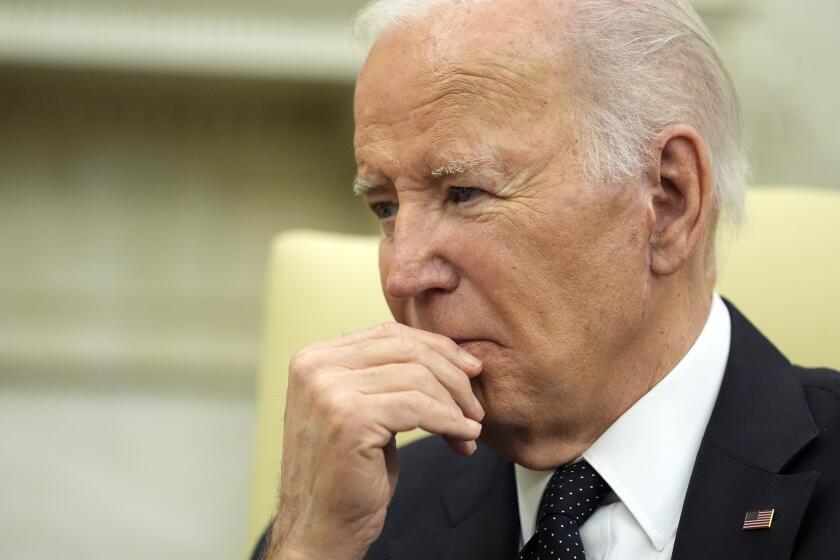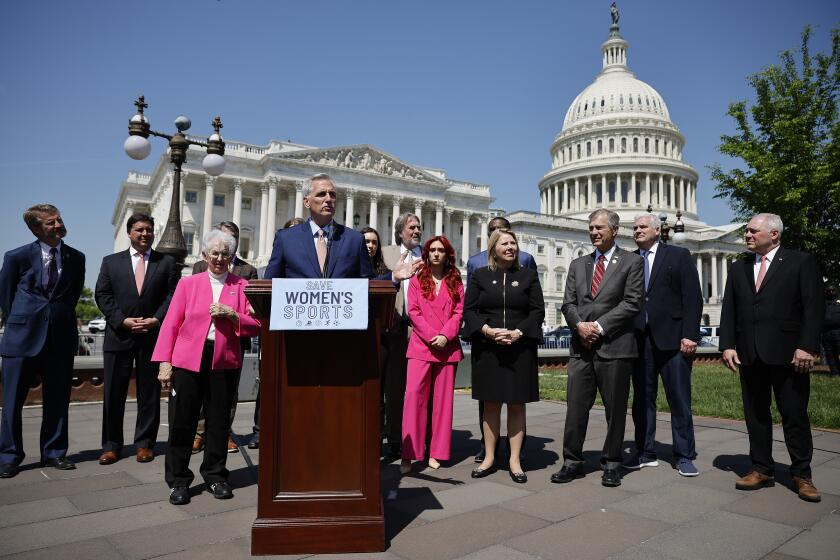Op-Ed: When Trump treats other nation’s borders as fungible, the dangers should be clear

When President Trump drew international criticism for recognizing Israeli sovereignty over the Golan Heights, Secretary of State Michael R. Pompeo said, “We are simply recognizing facts on the ground.” After all, Israel has controlled the territory since it was captured from Syria in the 1967 war, annexed it in 1981 and despite the lack of international recognition until now, is unlikely to give it up for security reasons. Trump has applied a similar logic to his recognition of Jerusalem as Israel’s capital: “For many years, we failed to acknowledge the obvious, the plain reality that Israel’s capital is Jerusalem.” Israel controls these territories, this logic goes. Why pretend otherwise?
If only it were that simple. To start with, “reality” has not been the standard this administration has used in crafting its foreign policy positions, and I’m not just talking about its frequent lies and distortions. Since late January, the Trump administration has taken the diplomatic position that Juan Guaido is the president of Venezuela, when that is plainly not the case. Nicolas Maduro is a corrupt dictator with no democratic legitimacy, but he is the man in control of Venezuela’s government and military, whether or not we’d like that to be true.
The Trump administration’s approach to questions of sovereignty isn’t about facts. Though enforcing U.S. borders has been the defining issue of his presidency, he and his advisors frequently act as if other countries’ borders are fungible, and Trump has the power to unilaterally redraw them.
Trump has signaled that as far as the U.S. is concerned, the map of the world is open to adjustment and the result is unlikely to be a more stable world.
Roughly since the breakup of the Soviet Union and Yugoslavia, the world has been living through a peaceful quarter-century of what I call “cartographical stasis,” in which the creation of new countries and changes to existing borders have been relatively rare, along with, not coincidentally, territorial wars. There are a variety of reasons for the stasis, but a crucial one is an international norm that came into effect after World War II: Nations respect each other’s sovereignty; one country does not annex or claim another’s territory, at least not with impunity.
The United Nations Charter underlines this most directly in Article 2: “All members shall refrain in their international relations from the threat or use of force against the territorial integrity or political independence of any state.” But the norm is broader than the use of force. Even peaceful succession movements and plans to negotiate the swap of territory are generally frowned upon. As German Chancellor Angela Merkel recently put it: “There are perhaps attempts to talk about borders and we can’t do that.”
The United States has generally acted as an enforcer of the sovereignty norm. While it has certainly used force against foreign countries on numerous occasions, it has more often been to preserve current national borders — against Iraqi annexation in 1991 or the emergence of Islamic State starting in 2014 — than to change them. (The U.S. intervention in the Kosovo war and eventual recognition of that country’s independence is a notable exception.)
The U.S. stance was defined in a 2014 speech by President Obama who, though famously opposed to the 2003 Iraq war, argued that it was more legitimate than Russia’s annexation of Crimea because, “We did not claim or annex Iraq’s territory. We did not grab its resources for our own gain.”
President Trump, who said throughout his campaign that the U.S. “should’ve kept the oil” in Iraq, obviously sees things differently. Before his inauguration, Trump suggested he might alter the longstanding “One China” policy formally recognizing Beijing’s sovereignty over Taiwan. He later backed down, and then went to the opposite extreme, telling an interviewer Taiwan “actually used to be a part of China,” a historically dubious claim.
According to the Guardian, former Trump foreign policy advisor Sebastian Gorka once advocated partitioning Libya into three areas based on Ottoman provinces, drawing his proposed new map on a napkin in front of an apoplectic European diplomat.
National security advisor John Bolton has declared the U.S. open to a controversial plan that would see Kosovo and Serbia swap land to resolve their long-running political dispute, going against the recommendations of both Kosovo’s president and European leaders like Germany’s Merkel.
While the U.S. has maintained its non-recognition of Russia’s claim to Crimea, Trump is at least ambivalent in the matter, telling G7 leaders, according to a report in Buzzfeed, that Crimea is Russian because the majority of its population speaks Russian.
Enter the Fray: First takes on the news of the minute »
Jared Kushner’s much anticipated Middle East peace plan at one point reportedly involved Jordan giving land to the Palestinians and receiving land in exchange from Saudi Arabia, as if these Arab parcels were interchangeable. And now Trump has twice recognized Israeli claims to contested territory, undermining the international consensus that such disputes should be resolved as part of a larger negotiation.
The reason to be concerned about the administration’s actions is not that the world’s national borders are ideal. In many regions, boundaries were drawn by colonial powers and contribute to ongoing conflict and instability. But annexations and partitions rarely end in peace. Tragic examples like the breakup of Yugoslavia or carving Pakistan out of India are sadly more common.
It now seems quite plausible that the Russian government, which rarely misses a chance to point out Western hypocrisy, could use Trump’s “facts on the ground” logic to bolster its invasion of Crimea and its occupation of Georgia’s breakaway regions. China could cite the administration’s actions as precedent for its disputed territorial claims over the South China Sea. Nuclear-armed rivals India and Pakistan could be emboldened in their clash over Kashmir.
More broadly, Trump has signaled that as far as the U.S. is concerned, the map of the world is open to adjustment and the result is unlikely to be a more stable world.
Joshua Keating is a senior editor at Slate and the author of “Invisible Countries: Journeys to the Edge of Nationhood.”
Follow the Opinion section on Twitter @latimesopinionand Facebook
More to Read
A cure for the common opinion
Get thought-provoking perspectives with our weekly newsletter.
You may occasionally receive promotional content from the Los Angeles Times.






